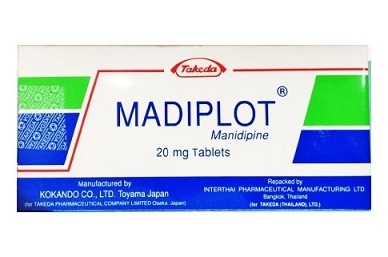BREAKING NEWS! Study Finds That Calcium Channel Blockers Used For Hypertension Actually Increased Odds For Glaucoma And Glaucoma Progression!
Nikhil Prasad Fact checked by:Thailand Medical News Team Sep 10, 2023 2 years, 4 months, 3 weeks, 5 days, 22 hours, 33 minutes ago
Ophthalmology News: In an alarming discovery, a recent international stud yby researchers from the University College London Institute of Ophthalmology-UK, Clínica Oftalmológica Pasteur-Chile, City University of London-UK, University Irving Medical Center-New York, Brigham and Women’s Hospital-USA, Harvard Medical School-USA, Icahn School of Medicine-New York-USA, St Thomas’ Hospital-UK and King’s College London-UK has identified an adverse association between the use of calcium channel blockers (CCBs) and glaucoma. This unexpected link has sent shockwaves through the medical community, as CCBs are commonly prescribed medications for managing hypertension and other cardiovascular conditions.

Examples of calcium channel blockers include:
-Amlodipine (Norvasc).
-Diltiazem (Cardizem, Tiazac, others).
-Felodipine.
-Isradipine.
-Manidipine (Madiplot)
-Nicardipine.
-Nifedipine (Procardia).
-Nisoldipine (Sular).
-Verapamil (Verelan).
According to
Ophthalmology News updates
, glaucoma is a growing eye issue and it is estimated that 57.5 million people worldwide are affected by primary open-angle glaucoma (POAG). People over 60 years of age, family members of those already diagnosed with glaucoma, steroid users, diabetics, as well as those with high myopia, hypertension, central cornea thickness of <5 mm, and eye injury are at an increased risk of glaucoma. By 2040, it is expected that approximately 111.8 million people will suffer from glaucoma!
https://www.ncbi.nlm.nih.gov/pmc/articles/PMC7769798/
The study, led by Dr Alan Kastner from Moorfields Eye Hospital National Health Service Foundation Trust and University College London, sheds new light on the potential risks associated with these widely used drugs.
The study delved into the association between systemic channel blockers (CCB) use and glaucoma, as well as related traits, by conducting a population-based cross-sectional analysis involving participants from the UK Biobank. The dataset included a staggering 427,480 adults, with a median age of 58 years, among whom 7.8 percent were channel blockers (CCB users).
The findings from this extensive study are both startling and thought-provoking. While CCBs have been used for years to manage high blood pressure and cardiovascular conditions, their use was linked to a 39% increase in the odds of developing glaucoma.
This significant association persisted even after adjusting for key factors such as sociodemographic variables, medical history, anthropometric measurements, and lifestyle factors.
One of the most intriguing aspects of this study is that the adverse association between CCB use and glaucoma was not found with other antihypertensive agents. This suggests that there might be something unique to CCBs that makes them particularly prone to this risk. (Note however that other studies are currently underway on beta blockers and ARBs usag
e on glaucoma)
Furthermore, the study also examined the impact of CCB use on the structural aspects of the eye, specifically the macular ganglion cell-inner plexiform layer (mGCIPL) and macular retinal nerve fiber layer (mRNFL) thicknesses. It was discovered that CCB users had thinner mGCIPL and mRNFL, providing a structural basis to support the observed association with glaucoma.
Perhaps the most intriguing aspect of this study is the fact that CCB use did not seem to affect intraocular pressure (IOP). This is significant because glaucoma has traditionally been associated with elevated IOP, and many treatments for glaucoma aim to reduce it. The lack of a clear IOP effect in CCB users suggests that there may be an IOP-independent mechanism at play in the development of glaucoma among this group.
While these findings are groundbreaking, it's important to note that a causal relationship between CCB use and glaucoma has not been definitively established. The study's authors caution that further investigation is needed to determine whether these associations are indeed causal and to uncover potential underlying biological mechanisms.
This discovery has raised many questions within the medical community. Could it be that CCBs, despite their effectiveness in managing hypertension and cardiovascular conditions, may pose an unintended risk to the eyes? If a causal link is established, it would represent a significant challenge for healthcare providers who must weigh the benefits of blood pressure control against the risk of glaucoma development or progression in their patients.
Additionally, this study has sparked a debate about the potential need to reconsider the use of CCBs in patients at risk for glaucoma or those already diagnosed with the condition. The study's authors suggest that healthcare providers may need to consider alternatives to CCBs in these cases, particularly if glaucoma progresses despite optimal care.
The implications of this study extend beyond the medical field into the pharmaceutical industry. Several authors of the study disclosed ties to the pharmaceutical industry, which underscores the importance of conducting independent research to assess the safety and efficacy of widely prescribed medications.
In conclusion, this groundbreaking study has revealed a previously unrecognized adverse association between the use of calcium channel blockers and the risk of glaucoma. While further research is needed to establish causality and uncover the underlying mechanisms, these findings raise important questions about the use of CCBs in patients at risk for glaucoma. Healthcare providers and patients alike must be aware of this potential risk and consider alternative treatments or close monitoring for glaucoma in individuals using CCBs. This discovery serves as a stark reminder of the importance of ongoing research to ensure the safety and effectiveness of commonly prescribed medications.
The study findings were published the peer reviewed journal: JAMA Ophthalmology.
https://jamanetwork.com/journals/jamaophthalmology/article-abstract/2809275
Note: A few more studies underway that will be published in a few weeks’ time also show that angiotensin II receptor blockers (ARBs) and beta blockers used in hypertension therapy can also worsen glaucoma conditions!
For the latest
Ophthalmology News, keep on logging to Thailand Medical News.
